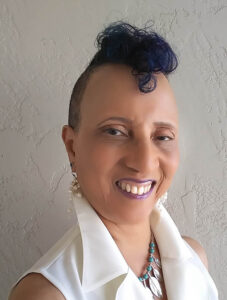Women in Horror: Interview with Linda D. Addison

 Linda D. Addison, the author of five award-winning collections, including The Place of Broken Things written with Alessandro Manzetti, & How To Recognize A Demon Has Become Your Friend, recipient of the HWA Lifetime Achievement Award and SFPA Grand Master of Fantastic Poetry. Her site: www.LindaAddisonWriter.com.
Linda D. Addison, the author of five award-winning collections, including The Place of Broken Things written with Alessandro Manzetti, & How To Recognize A Demon Has Become Your Friend, recipient of the HWA Lifetime Achievement Award and SFPA Grand Master of Fantastic Poetry. Her site: www.LindaAddisonWriter.com.
What inspired you to start writing?
From the first time that I saw a book and realized it was a story that someone made up I knew I wanted to do the same thing. I had an active imagination and all my daydreaming involved things that weren’t quite real: things with wings that weren’t birds, etc. I loved the idea of fantastic creatures and magical lands.
What was it about the horror genre that drew you to it?
The idea of being able to write a story or poem and put in it anger, fear, monsters was right down my alley once I became comfortable with facing my own fears.
Do you make a conscious effort to include female characters and themes in your writing and if so, what do you want to portray?
It has been said write what you know which makes it easy for me to include female characters, but I also grew up with seven brothers so I don’t really have a problem writing male or female characters. What I have found is that if I write a main character who is male or female, then in the next piece I tend to switch to the other sex, just to keep myself interested.
What has writing horror taught you about the world and yourself?
I’ve learned to face my own shadows, to understand that to be human means to have many qualities that society doesn’t consider positive. I’ve learned that every trait we have, as a human, has its strengths and weaknesses; more than anything else it’s important to love every part of ourselves, in that way, if we see something we want to change, we can.
How have you seen the horror genre change over the years? And how do you think it will continue to evolve?
Many years ago when I first started reading horror there were very few women writers or other diverse communities. It has changed since then, but we still see anthologies being published and awards/recognition that don’t have balanced representation. There is still much work to be done to continue opening the field to all voices.
How do you feel women have been represented thus far in the genre and what hopes do you have for representation in the genre going forward?
At least the discussion has quieted about whether or not women can write horror. There’s effort being put into writing female characters who are not weak and faint when in stressful situations. Still, there’s so much more that needs to be done to get rid of these clichés. Events like “Women In Horror Month” help to open the eyes of creative people, publishers, and readers to women writing horror who they may not know.
Who are some of your favorite female characters in horror?
There are many, a few I will mention are: Jessica from “My Soul to Keep” by Tananarive Due; Damali Richards from “The Damned” by L. A. Banks; Dr Foxy from “Her Life Matters” by Alessandro Manzetti; Jacqueline from “Invisible Chains” by Michelle Renee Lane. It’s a long list.
Who are some women who write horror you recommend our audience check out?
Here are some I enjoy (there are many more): Akua Lezli Hope, Eugen Bacon, Terese Pierre, Andrea Vocab Sanderson, Tenea D. Johnson, Tananarive Due, Sumiko Saulson, Jewelle Gomez, Walidah Imarisha, Justina Ireland, Tish Jackson, Valjeanne Jeffers.
What is one piece of advice you would give horror authors today?
It’s really important to be in touch with your own sensibilities, your feelings of what makes you angry, fearful, frustrated, and then write from those emotions; put them into the work you’re creating. If you put energy in your own stories, the readers are going to find it also.
And to the women who write horror out there who are just getting started, what advice would you give them?
The field may see you as a woman writing horror, but I chose to see myself as a human writing horror and I insist on being treated that way regardless. Don’t let others limitations restrict you.



